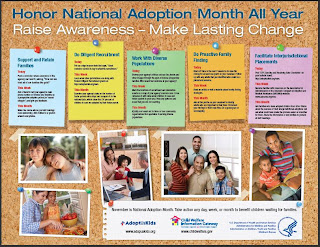
Yesterday was Mother's Day.
In the LGBT community, this day - along with its twin, Father's Day - has special significance. This day marks a point of special remembrance for those of us with positive, supportive parents, and it's a sad spot of bittersweet for folks whose parents did not embrace their LGBT kid.
For gay parents, it's a point of pride: "We're parents!" It's also almost always a source of initial consternation for parents and teachers. If both parents are guys, does one take Mother's Day and one take Father's Day? What do teachers have kids do for a Mother's Day craft if there's no mother in the picture? What about trans parents?
Fortunately, ultimately, issues of sex and gender aren't generally that troublesome for LGBT folks. I have gay dad friends who have one partner take Mother's Day and one take Father's Day. I also know couples where both lesbian parents take Mother's Day - it's two-times the work for the kid, but then they get to skip Father's Day. And my trans parental friends get the day of their target sex.
As for schools, teachers have been handling issues like this forever, what with the supply of single and adoptive parents. On Mother's Day if there are only dads in the parental picture, generally the teachers have the kid do a craft for a special aunt, or grandmother, or even for their dad(s). The point is to honor a special person (or people). There's no need to get bogged down in the details. The goal is familial joy, not stress (though most happy families get to have both!).
(The Washington Post has a
blog article on this very topic. Also, The Guardian across the pond has
an article on how more gay people are becoming parents and how that's affecting gay spending (or as they call it, "the pink pound").)
(For the record, Kid/we took Craig's Mom (Grams) out to see a show (Charlotte's Web, which Craig is music directing at a local community theater) and then we all did Chinese afterwards. There were also flowers and chocolate-covered strawberries for Craig's Mom earlier in the week. Craig's Mom is the only matron left for us, so she reaps the full M-Day bounty!)
For the first time in history, we've had a president include gay parents in a Mother's Day proclamation. President Obama, in
yesterday's proclamation, said:
“Whether adoptive, biological, or foster, mothers share an unbreakable bond with their children, and Americans of all ages and backgrounds owe them an immeasurable debt. Nurturing families come in many forms, and children may be raised by two parents, a single mother,
two mothers, a step-mom, a grandmother, or a guardian.”
(The bold is mine to highlight the "two mothers" bit.)
It's just a symbolic reference, but symbols do count.
I have a coworker who is fond of saying "Enjoy your crumbs!" whenever someone in authority makes an LGBT-positive reference but doesn't back it up with any quantifiable action for equality. It's a completely valid point, and the president's Mother Day's proclamation received quite a lukewarm reception from many gay groups, specifically for being empty words in light of lack of action on supporting ENDA and not working against DADT and DOMA. (The LGBT community seems to live a life of acronyms!)
Now, I have more faith in crumbs. People remember words, and the more our families are put out there in front of the public, the more people will realize the terrible effects of discrimination, both individual and abstract and discrete and formalized (as in laws). It's a drop in the ocean, but the ocean would be one drop less if it weren't there.
It's a symbol, sure, but compare it to what's been there before - or hasn't. It's absence would've sent quite a different message. Sometimes a symbol can be both the message and the substance.
We hope everyone had a happy Mother's Day!
 Every year, there are a variety of events, activities, and observances that are relevant to the LGBT community. It's difficult to get a comprehensive list, but here is a good start on upcoming days of observance to be aware of.
Every year, there are a variety of events, activities, and observances that are relevant to the LGBT community. It's difficult to get a comprehensive list, but here is a good start on upcoming days of observance to be aware of.



















